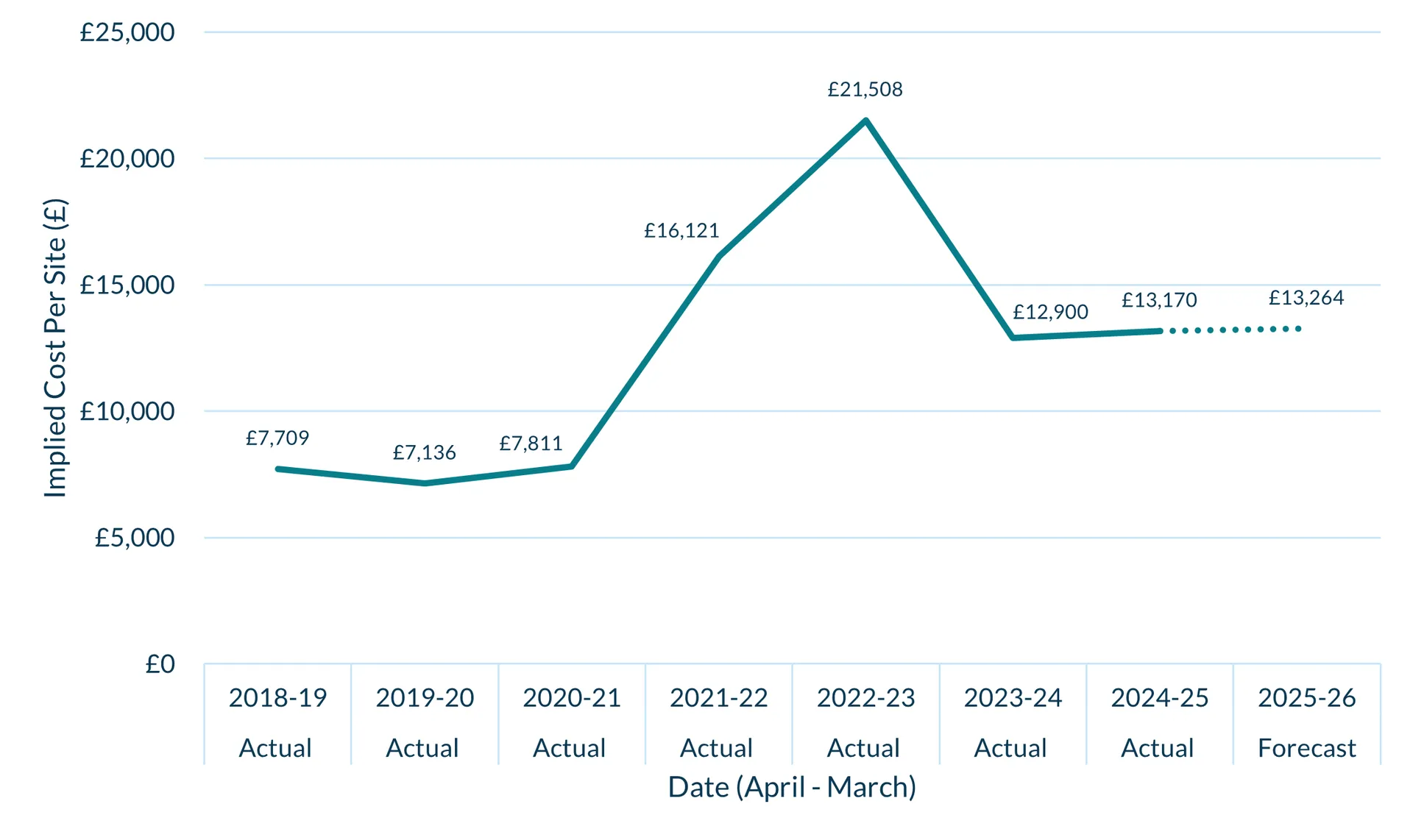"For all the criticism of the household energy price cap, it does provide a level of protection that businesses simply do not have. "
Dr Craig Lowrey Principal Consultant
Data from Cornwall Insight’s newly launched Business Energy Cost Forecast reveals that a typical small business such as a pub, restaurant or independent retailer1 is paying over £5,000 more a year in energy bills than prior to the energy crisis, with bills predicted to rise further from the April 2025 - March 2026 contract period2.
The small business index included in the forecast, predicts annual electricity bills to be an average of £13,264 by April 2025 - 70% more than 2020-2021. The data is calculated from April to March, aligning with when most businesses renew their energy contracts.
Cornwall Insight’s Business Energy Cost Forecast, the business equivalent of their domestic Default Tariff Cap (price cap) forecast, shows that although energy bills have stabilised in recent years, they remain substantially above pre-2021 levels of £7,000 - £8,000 per year (figure 1) for a typical small business. A trend which is forecast to continue into 2025 and likely beyond.
While wholesale energy prices have decreased since the peak of 2022-2023 - when a typical small business’s annual electricity bill could be expected to reach more than £20,000 - the market has never fully recovered from the impacts of the energy crisis and the Russian invasion of Ukraine, which is keeping prices higher. Global events continue to impact the market, with recent tensions in Russia causing a fresh increase in wholesale prices. This, coupled with a slight rise in standing charges, is expected to push business energy costs up a small amount compared to 2024-2025.
Unlike household energy bills, businesses do not benefit from a price cap to protect them from soaring bills. Business groups have urged the government to increase support, arguing that their rising energy bills haven't received the same level of concern as household expenses - despite the crucial role businesses play in the economy.
With businesses across the country experiencing similar challenges, these persistently high costs highlight the urgent need for the government to establish a sustainable and long-term energy plan, focused on delivering domestically produced renewable energy, to shield our prices from international volatility, and ultimately lower bills.
Figure 1: Electricity cost per site based on a typical small business usage of 50MWh a year

- The years runs from April to March, aligning with when most businesses renew their electricity contracts Source: Cornwall Insight’s Business Energy Cost Forecast – Small Business Index
Figure 2: Business Energy Cost Forecast, implied electricity cost Per Unit and Per Day 2025-2026

- The years runs from April to March, aligning with when most businesses renew their electricity contracts Source: Cornwall Insight’s Business Energy Cost Forecast – Small Business Index
Dr Craig Lowrey, Principal Consultant, Cornwall Insight:
“Our Business Energy Cost forecast shows businesses are faring no better than households, with bills still substantially above historic averages. While prices may have settled from their peak crisis levels, they are far from being sustainable for the numerous smaller businesses already struggling in this economic climate.
“For all the criticism of the household energy price cap, it does provide a level of protection that businesses simply do not have. Given the impact of the cost-of-living crisis on consumer spending and high street trade, the government will need to seriously consider how to support businesses with their high energy costs if they want to prevent further closures.
“The persistent challenges in the energy market, especially after the turbulence of the past two to three years, highlight just how fragile the energy system remains. Even a minor global incident can ripple through the market, maintaining higher wholesale prices and fuelling ongoing concerns about volatility.
“The only way we are going to deliver sustainable lower energy bills is to deal with the problem at the source – the energy generation. This requires a strong governmental focus on boosting domestic production and reducing our exposure to international disruptions. While this solution is neither quick nor easy, it is essential for achieving long-term stability in energy costs."
Reference:
- This is based on a typical usage of 50MWh of electricity a year, which is within the Department for Business, Energy & Industrial Strategy and Department for Energy Security and Net Zero classification of a small non-domestic user (20MWh to 499MWh per annum).
- The data is calculated from April to March, aligning with when most businesses renew their electricity contracts.
- Ends
Notes to Editors
For more information, please contact: Verity Sinclair at v.sinclair@cornwall-insight.com To link to our website, please use: https://www.cornwall-insight.com/
Copyright disclaimer for commercial use of the press releases: The content of the press release, including but not limited to text, data, images, and graphics, is the sole property of Cornwall Insight and is protected by UK copyright law. Any redistribution or reproduction of part or all of the content in any form for commercial use is prohibited without the prior written consent of Cornwall Insight.
Media Use Exemption: The information included in this press release may be used by members of the media for news reporting purposes only. Any other commercial use of this information is prohibited without the prior written consent of Cornwall Insight. All non-media use is prohibited, including redistribution, reproduction, or modification of our content in any form for commercial purposes, and requires prior written consent. Please contact: enquiries@cornwall-insight.com
About the Cornwall Insight Group Cornwall Insight is the pre-eminent provider of research, analysis, consulting and training to businesses and stakeholders engaged in the Great British, Irish, Australian, German and Japanese energy markets. To support our customers, we leverage a powerful combination of analytical capability, a detailed appreciation of regulation codes and policy frameworks, and a practical understanding of how markets function.

